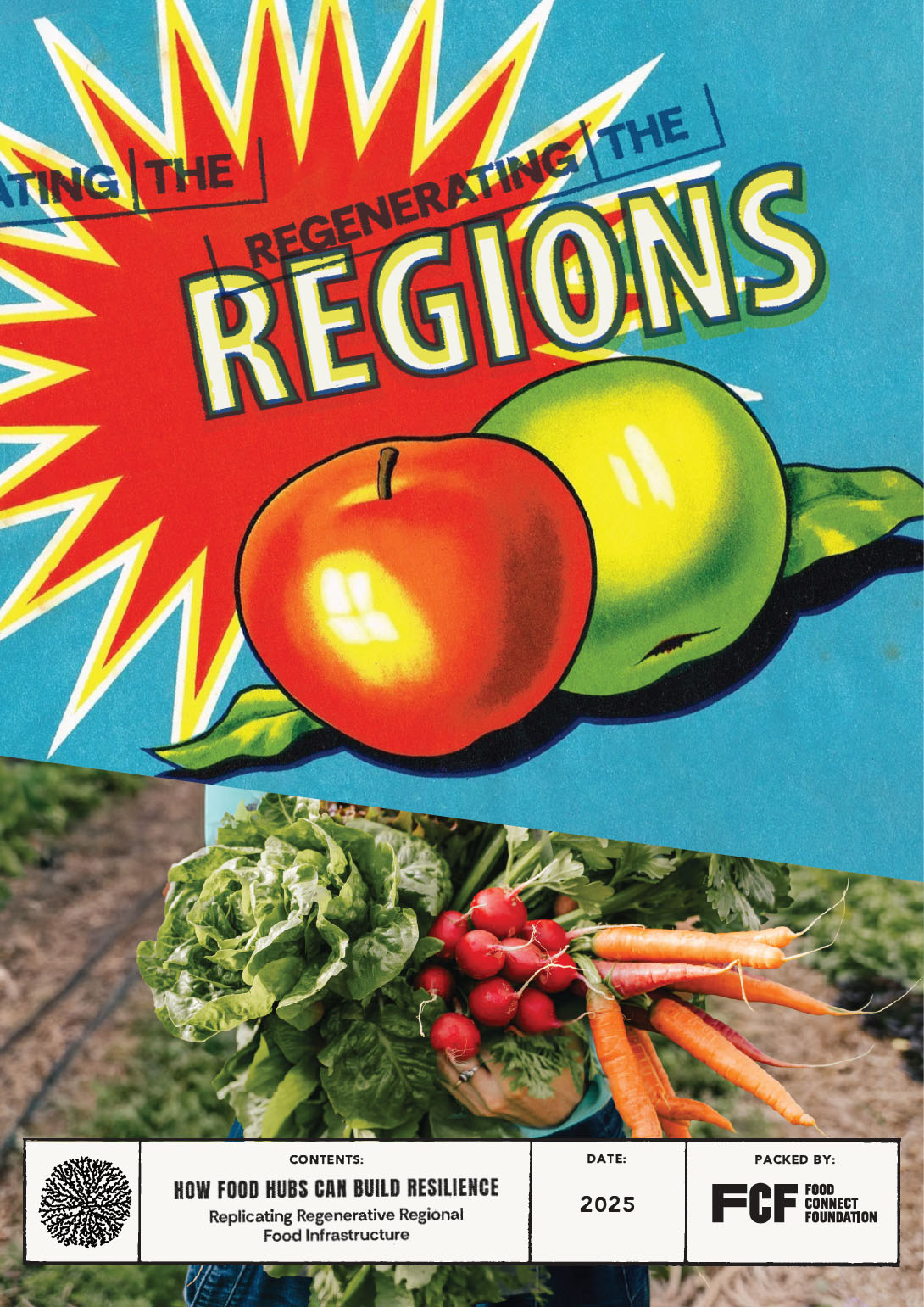Food Connect Foundation, Media Release, 24 November 2025
A new report from the Food Connect Foundation reveals how community-owned food infrastructure can build resilience into Australia’s food system at a time of rising climate, health and supply chain pressures. The Food Connect model addresses the nation’s food security challenges while supporting farmers and building climate resilience.
Regenerating the Regions: How Food Hubs Can Build Resilience, authored by Robert Pekin and Emma-Kate Rose, draws on more than 20 years of hands-on experience building fair, localised food systems; including raising $2M in equity to purchase and operate Food Connect Shed, Brisbane’s first community-owned food hub.
The report demonstrates how community-owned food hubs can be scaled and replicated around Australia. It provides a practical guide including financial structure and community ownership, as well as how to build networks between food producers and food consumers.
Food hubs are regionally based, shared-use facilities that make it easier for farmers and small food businesses to reach markets on fair terms. They aggregate produce, provide essential infrastructure, offer business support, and connect small and regenerative producers with local buyers. By integrating commercial operations with social enterprise principles, food hubs strengthen regional economies, shorten supply chains, and help communities access nutrient-dense food. They also create circular, regenerative feedback loops that improve landscape health and community resilience.
Since its 500+ ‘Careholders’ took ownership in 2018, Food Connect Shed has:
- Quickly achieved and maintained profitability, and delivered an estimated social ROI of $3.20–$4.80 per dollar invested;
- Supported hundreds of farmers, makers and small businesses;
- Provided cold storage, commercial kitchens, processing facilities and networks otherwise inaccessible to small producers;
- Demonstrated the commercial viability of a hybrid social enterprise model; and
- Created a replicable blueprint for community food infrastructure that strengthens local economies and improves food security.
The new report shows how a national network of these hubs could be funded and built, and the investment opportunity it presents for the regions. By replicating Food Connect Shed’s model, communities, government and industry can collaborate to address the critical “missing middle” between farm production and mainstream markets.
Co-authors Rose and Pekin, alongside social impact expert Elise Parups, will discuss the report and potential impact in a national launch webinar at 11:30am AEST, Thursday 27 November.
Robert Pekin, founder and co-CEO at Food Connect Foundation, said: “As a former dairy farmer I know the challenges farmers face in growing sustainable food for a market that’s dominated by supermarkets and fast food. Local food hubs give farmers a way to sell directly to wholesale or retail customers that care. That means they can grow in the ways they know are best for nature, the climate and human health. Because their buyers share these values.”
Emma-Kate Rose, Co-CEO, Food Connect Foundation said: “Food Connect Shed proves what’s possible when communities invest in their own future. This report captures what we’ve learned and demonstrates how regional food hubs can replicate that success to rebuild the infrastructure Australia urgently needs – for farmers, for our health, for climate, for secure access to food. Our strategy is a practical roadmap for more communities to follow, and strengthen the resilience of our food system for the long term.”
Anne Yan, Innovation Specialist at WWF Australia, said: “Food Connect’s model represents exactly the kind of transformational, community-led solution the Innovate to Regenerate program was designed to support. We’re proud to fund research that can help scale this innovative approach and accelerate Australia’s transition to a regenerative economy.'”
National Online Launch Event
Hear the authors present their findings, explore the investment case for regional food hubs, and join a national conversation on food system resilience. Hosted by Elise Parups, Emma-Kate Rose and Robert Pekin.
11:30am AEST, Thursday 27 November
Online. Free registration required
Presentation, live Q&A and access to the full report
Register: https://events.humanitix.com/report-launch-regenerating-the-regions-how-food-hubs-can-build-resilience

